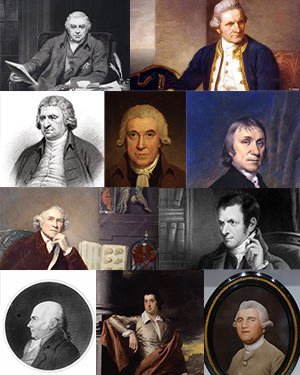The Lunar Society of Birmingham was a group of prominent figures in the Midlands Enlightenment, including industrialists, natural philosophers, and thinkers who met regularly in Birmingham, England, between 1765 and 1813. The society was an exclusive club that never had more than fourteen core members, and each member was noted for their special area of expertise, including the greatest engineers, scientists, and thinkers of the day. The society gained its name as its monthly meetings were always scheduled for the Monday nearest to the full moon, the better light helping to ensure the members a safer journey home along the dangerous, unlit streets. The ranks of the dozen or so regular members of the Lunar Society were often swelled by visits and correspondents from more peripheral members, including the likes of Thomas Jefferson, Benjamin Franklin, Sir Richard Arkwright, Thomas Bedoes, Anna Seward, John Smeaton, etc. The Lunar Society was very particular about who was allowed to become a member. The society met regularly in Birmingham, England, and fostered the Midlands Enlightenment, a cultural manifestation of the Enlightenment within England.

History
The Lunar Society was founded in 1765 by a group of amateur experimenters, tradesmen, and artisans who met and made friends in the Midlands. The society was initially called the Lunar Circle, but it became the formal name by 1775. The name arose because the society would meet during the full moon, as the better light helped to ensure the members a safer journey home along the dangerous, unlit streets. The society was founded by Matthew Boulton, Erasmus Darwin, James Watt, Josiah Wedgwood, Joseph Priestley, and William Withering. Other members included John Whitehurst, William Small, James Keir, and Richard Lovell Edgeworth. The society’s ranks were often swelled by visits and correspondents from more peripheral members, including the likes of Thomas Jefferson, Benjamin Franklin, Sir Richard Arkwright, Thomas Bedoes, Anna Seward, John Smeaton, etc. The society was a forum for the exchange of ideas and the discussion of scientific and philosophical topics. Members of the society were interested in a wide range of subjects, including chemistry, physics, astronomy, medicine, and engineering.
The Lunar Society was very exclusive, and membership was by invitation only. The society never had more than fourteen core members, and each member was noted for their special area of expertise. The society was also known for its hospitality, and members would often bring guests to the meetings. The society met regularly at Soho House in Handsworth, the home of Matthew Boulton, who was the heart of the Lunar Society.
Achievements
The Lunar Society of Birmingham had a significant impact on the Industrial Revolution. The society’s members were responsible for many important scientific and technological advances, and their ideas and innovations helped to shape the modern world. The society’s emphasis on the exchange of ideas and the discussion of scientific and philosophical topics also helped to create a culture of innovation and inquiry that continues to this day. Here are some of the ways in which the Lunar Society impacted the Industrial Revolution:
– The society was involved in the development of the steam engine, which was a key technology of the Industrial Revolution. Members of the society, including James Watt and Matthew Boulton, were instrumental in the development of the steam engine, which revolutionized transportation and manufacturing.
– The society was involved in the development of the canal system, which was another key technology of the Industrial Revolution. Members of the society, including Josiah Wedgwood, were involved in the construction of canals, which made transportation of goods faster and cheaper.
– The society was involved in the discovery of oxygen, which was a key scientific breakthrough that had many practical applications. Joseph Priestley, a member of the society, discovered oxygen in 1774.
– The society was involved in the development of the pneumatic tire, which was a key innovation in transportation. John Boyd Dunlop, who was not a member of the society but was inspired by their ideas, invented the pneumatic tire in 1888.
– The society was involved in the promotion of religious tolerance and the abolitionist movement. Members of the society, including Erasmus Darwin and Joseph Priestley, were advocates for religious freedom and the abolition of slavery.
Decline
The Lunar Society declined in the early 19th century due to a combination of factors. The death of key members, including Matthew Boulton and James Watt, weakened the society. The rise of other scientific societies, such as the Royal Society, also contributed to the decline of the Lunar Society. The society also suffered from political unrest, including the riots in Birmingham against Joseph Priestley, a staunch supporter of Unitarianism and the French Revolution, which led to the society’s further decline. In 1791, a popular outbreak occurred in Birmingham, which threatened the very existence of the Lunar Society. A riotous mob, led by designing men of the baser sort, took possession, as it were, of the town, and for four days (July 14th to 17th) pillaged and destroyed private property to the value of over one hundred thousand pounds. Priestley’s home and laboratory were pillaged and burned to the ground. The members of the Lunar Society, popularly known as “Lunatics,” were the especial object of their hatred and zeal.
Legacy
The Lunar Society had a profound impact on the development of science and technology in England. The society’s members were responsible for many important scientific and technological advances, and their ideas and innovations helped to shape the modern world. The society’s legacy can be seen in the many scientific and technological advances that have been made since its founding. The society’s emphasis on the exchange of ideas and the discussion of scientific and philosophical topics also helped to create a culture of innovation and inquiry that continues to this day.
Citations:
[1] https://en.wikipedia.org/wiki/Lunar_Society_of_Birmingham
[2] http://media.bloomsbury.com/rep/files/Primary%20Source%2011.2%20-%20Lunar%20Society.pdf
[3] https://lunarsociety.org.uk/newsletter-archive/
[4] https://www.historic-uk.com/CultureUK/The-Lunar-Society/
[5] https://historywm.com/films/the-friends-who-changed-the-world-birminghams-lunar-society
[6] https://engines.egr.uh.edu/episode/1726
The best way to keep in touch and to be aware of our events
Don’t forget to confirm your subscription in the Email we just sent you!

Please pre-book your visit over Christmas at least 24h in advance via Email or Online booking.
MondayClosed
Tuesday10:00 AM - 5:00 PM
Wednesday10:00 AM - 5:00 PM
Thursday10:00 AM - 5:00 PM
Friday10:00 AM - 5:00 PM
Saturday11:00 AM - 5:00 PM
Sunday11:00 AM - 5:00 PM
Adult €7.50
Children 10 to 16 €3
2 Adults & 2 Children €15
Adult is 16 years+
Family Ticket is 4 family members together
Children under ten are free but must be accompanied by an Adult

The Maria Edgeworth Centre is operated under the direction of the Edgeworthstown District Development Association (EDDA) – a Not for Profit Voluntary Community based registered charity Reg:223373. Registered Charity Number 20101916
© 2023 Maria Edgeworth Centre – All Rights Reserved
On the 17th of August 2024 as part of Heritage Week, with support from the County Heritage Officers, the Heritage Council, Longford County Council Libraries, Archives, Arts and Heritage,
IMMA, OPW and the Computer and Communications Museum Ireland on the NUIG Campus,
Ray Jordan and volunteers from the Maria Edgeworth Centre aim to simulate Edgeworth’s 1803 transmission by telegraph.
Click the link below to learn more or to register to attend either in person or via Zoom.
Join us for this recreation of a key moment in the history of communications